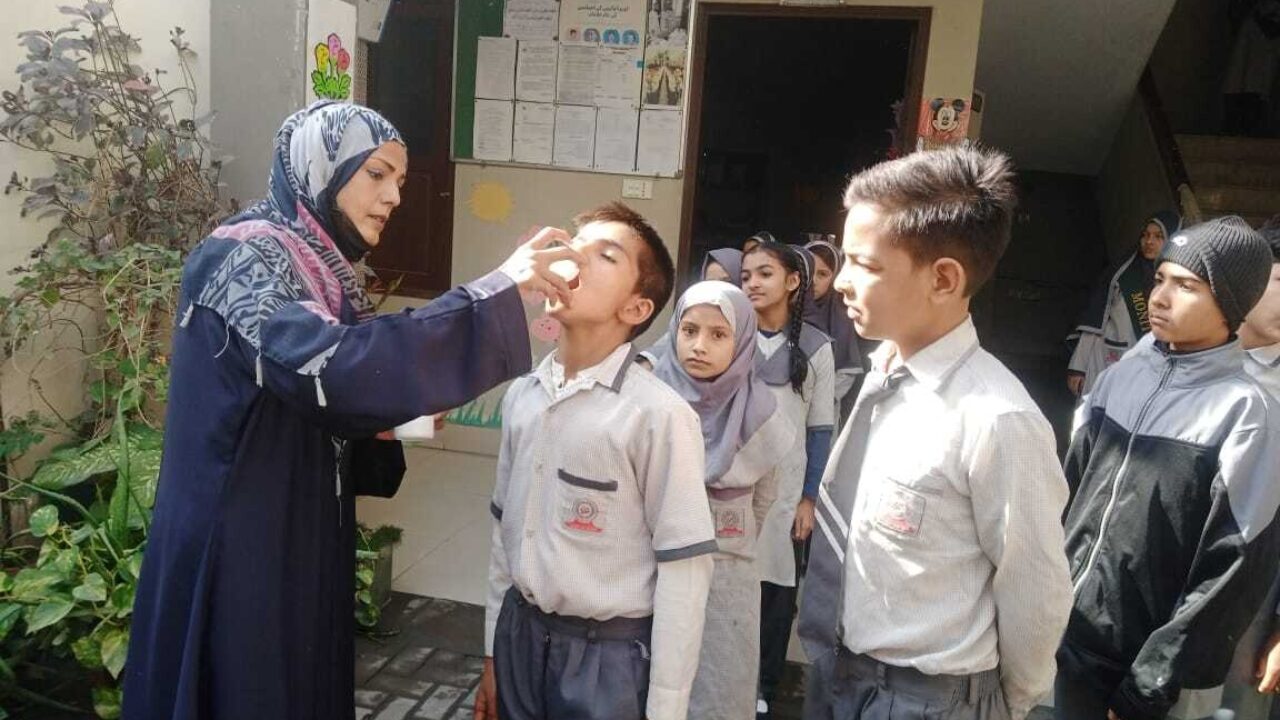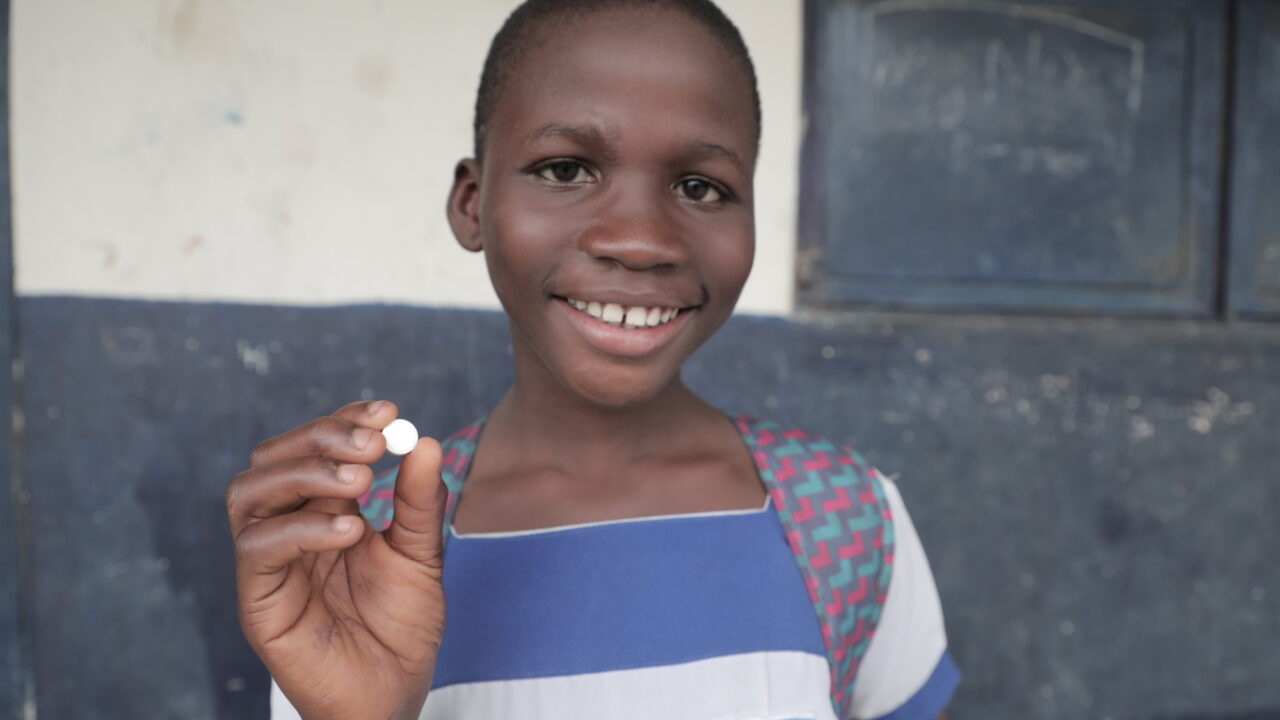In 2014, we partnered with Thrive Networks, with funding from Dubai Cares, to support the Government of Vietnam’s school-based deworming program. This partnership was significantly different from others typically entered into by our Deworm the World Initiative. One of the biggest differences was that deworming in schools was already taking place in Vietnam – and in many respects, the government had been successfully running the program at scale for several years. That’s not usually the context in which we initiate support. We typically support the establishment of programs, or if a program exists, where delivery is sporadic or ineffective and necessitates our technical assistance. In Vietnam, the existence of a fairly successful and consistent program meant that we tailored our approach to the government’s needs: support to improve the delivery, reach, and monitoring of their program in ways that would enhance its already significant coverage and cost-effectiveness, while bolstering their confidence in its impact.
The difference we made on program delivery
At the onset of our engagement, we identified a number of opportunities to improve program delivery. For example, deworming schedules and treatment strategies within provinces weren’t coordinated, meaning that treatment efforts could drag out over several weeks with varying approaches to treatment across provinces. With our support, the government streamlined deworming campaigns, shortening the time to conduct treatment within any given province to 1-2 days and synchronizing campaigns across the four targeted provinces so they occurred near simultaneously.
Another challenge we helped to address was related to the program’s reach. Despite its successes, the program consistently overlooked a critical group of students: children in satellite schools. Understandably (though regrettably) so: these schools, typically based in remote areas, were very difficult to reach. In a survey we commissioned in 2015, we found that over 1,300 satellite schools – representing roughly 40% of all schools but only 10% of the population in the provinces we were supporting – were not being reached by the program despite their need for it. Using this critical data, we advocated for and supported the integration of satellite schools into deworming campaigns and, by 2018, all satellite schools were targeted for deworming. This important achievement serves as inspiration for other countries and programs, as we were able to demonstrate to the government that it is possible to reach these children through the school-based platform.
We also helped introduce training for health professionals to deliver the program. In Vietnam, healthcare workers – who are located in each community – are responsible for delivering the program to students, which is different from what our model usually advocates for: leveraging teachers to deliver medication. Prior to our involvement in the program, the healthcare workers involved in deworming received no training relevant to deworming. We believe this kind of training is important: those at the frontlines need critical information about how to mobilize communities to participate, manage the treatment process, deliver the right dosage, correctly report on program reach, deal with adverse events- and so on. Over the course of our engagement in Vietnam, we helped initiate training sessions and worked to ensure those sessions also extended to teachers, whose participation in a school-based program is inevitable and whose buy-in, understanding, and support is invariably critical – including to provide education to children about the need for deworming, even if they’re not directly responsible for delivering treatments.
The difference we made on program monitoring
Another critical area we helped improve was program monitoring. While the government did have some (positive) data from their previous rounds of deworming, they also had some uncertainty about the credibility of these figures and the robustness of the monitoring mechanisms that generated them. They wanted to know with greater certainty that their deworming program was operating effectively and having its intended impact. We advocated for and introduced independent monitoring of the program, which tremendously improved the government’s confidence in the program and provided robust data that they could use for decision making. Through independent monitoring, we ascertained that each round of treatment conducted over the span of our partnership achieved extremely high coverage rates, reaching over 95% of kids in need – well beyond the World Health Organization target of 75%. This implementation success, no doubt coupled with the pre-existing success of the government’s deworming efforts, has translated into dramatic reductions in worm prevalence across three provinces. In Thanh Hoa, for example, worm prevalence among school-age children reduced by more than half – from 17.8% to 6.6% over the span of our partnership.
The difference we made in enabling evidence-based decision making
One of the greatest successes of our engagement over the last four years was in advocating for the development and in-practice adoption of WHO-aligned national deworming guidelines. In 2018, a new set of guidelines was officially adopted by the government and by the end of 2019, it was clear that the government had already begun to put these guidelines to use. Employing the new national deworming guidelines, the government has been empowered to make key programmatic decisions, including to scale back or stop deworming in areas that do not meet prevalence thresholds laid out by the WHO, and to ramp up deworming in areas with greater need. Our goal in Vietnam was always to improve the government’s capacity to effectively conduct mass, school-based deworming in using evidence and high-quality data. The result is more efficient and impactful allocation of resources.
Why we’re confident the program will continue to be effective
Last year, we concluded our support for the deworming program in Vietnam, at the end of the three-year project with Dubai Cares and Thrive Networks. Over the course of our engagement, we proudly supported the delivery of nearly 3 million deworming tablets. Despite no longer officially supporting the government, we remain available to provide strategic guidance and retain a keen interest in the program’s success. However, given the progress made over the last few years, and verified impact of the program, we have confidence that the government will continue to carry out a high quality deworming program to the benefit of millions of children.
Randomized Controlled Trial
Another unique feature of our support in Vietnam was our involvement with a randomized controlled trial designed to test whether augmenting the deworming program with the delivery of a hygiene education cartoon video to children had a more pronounced and lasting effect on rates of parasitic worm prevalence than deworming alone. Initial research suggested that hygiene education in addition to deworming treatment could dramatically reduce the rate of infection among kids. A unique approach leveraging the relatively advanced technologies present in Vietnamese schools, we were excited to build on the body of evidence and potentially scale this approach in other countries. Results of the study are forthcoming.



